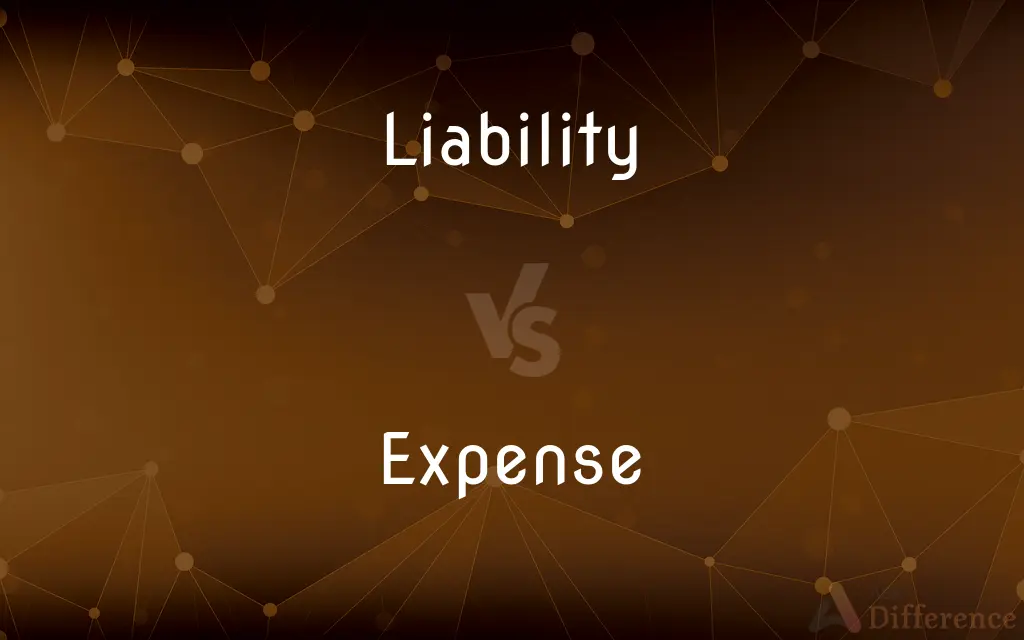Liability vs. Expense — What's the Difference?
By Urooj Arif & Maham Liaqat — Updated on March 20, 2024
Liability involves future financial obligations, while expense represents current consumption of economic benefits.

Difference Between Liability and Expense
Table of Contents
ADVERTISEMENT
Key Differences
Liabilities are financial obligations a company owes to external parties, often due to past transactions or events, and they need to be settled in the future. This can include loans, accounts payable, or mortgages. Expenses, on the other hand, are outflows or the using up of assets as part of a company's operations to generate revenue. These are recognized when the economic benefits are consumed during the period, not necessarily when the payment is made.
While liabilities are recorded on the balance sheet and represent future payments, expenses are reported on the income statement and reflect the costs associated with the current period's revenue generation. This distinction highlights the timing and purpose of each: liabilities are about what is owed for past transactions, and expenses are about the resources used up in the current period's operations.
Liabilities can include both short-term and long-term obligations, with varying due dates and implications for a company's financial health. Expenses, however, are typically expected to be recovered relatively quickly through the generation of revenue. For example, the cost of goods sold is an expense that directly relates to the revenue from sales in the same period.
The recognition of liabilities vs. expenses also impacts financial ratios and assessments. For instance, a high level of liabilities may indicate potential solvency issues, whereas high expenses might suggest operational inefficiencies or high costs of production. These financial metrics are crucial for stakeholders to assess a company's performance and financial health.
Managing both liabilities and expenses is crucial for a company's financial strategy. Effective liability management ensures that a company can meet its future obligations without strain, while efficient expense management is key to profitability and sustainability. Both require careful planning and control to support a company's long-term goals and financial stability.
ADVERTISEMENT
Comparison Chart
Nature
Future financial obligations
Current consumption of economic benefits
Recognition
On the balance sheet
On the income statement
Purpose
Represents what is owed
Reflects costs of operations
Timing
Related to past transactions
Incurred in the current period
Financial Impact
Affects solvency and liquidity
Affects profitability
Compare with Definitions
Liability
A financial obligation due to past transactions, to be settled in the future.
The company took on a liability when it borrowed funds to expand operations.
Expense
The cost incurred in the process of generating revenue, recognized when consumed.
Salaries paid to employees are considered an expense.
Liability
Recorded as a claim against the company's assets.
The loan increased the company's liabilities on the balance sheet.
Expense
Often reflects the cost of goods sold, salaries, and operational costs.
Rent for the office space is recorded as a monthly expense.
Liability
Requires management to ensure future solvency.
The CFO is focused on managing liabilities to maintain financial health.
Expense
Directly reduces net income for the period.
The increase in advertising expenses led to a lower net income.
Liability
Can be short-term (like accounts payable) or long-term (like mortgages).
The business's liabilities include a mortgage payable over 20 years.
Expense
Key focus area for cost control and profit maximization.
The management team is reviewing monthly expenses to identify cost-saving opportunities.
Liability
Often part of financing strategies for growth or operations.
The firm incurred liabilities to finance new equipment purchases.
Expense
Indicates how effectively a company uses its resources.
A reduction in unnecessary expenses improved the company's profitability.
Liability
The state of being liable.
Expense
Expenditure is an outflow of money, or any form of fortune in general, to another person or group as payment for an item, service, or other category of costs. For a tenant, rent is an expense.
Liability
Something for which one is liable; an obligation, responsibility, or debt.
Expense
The cost incurred in or required for something
Conference rooms were equipped at great expense
Book into the best hotel you can find and hang the expense
Liability
Liabilities The financial obligations entered in the balance sheet of a business enterprise.
Expense
Offset (an item of expenditure) as an expense against taxable income
Up to $17,500 in capital expenditures can be expensed in the year they were incurred
Liability
Something that holds one back; a handicap.
Expense
Something spent to attain a goal or accomplish a purpose
An expense of time and energy on the project.
Liability
Likelihood.
Expense
A loss for the sake of something gained; a sacrifice
Achieved speed at the expense of accuracy.
Liability
An obligation, debt or responsibility owed to someone.
Expense
An expenditure of money; a cost
An improvement that was well worth the expense.
A trip with all expenses paid.
Liability
(accounting) Any item recorded on the right-hand side of a balance sheet.
Expense
Charges incurred by an employee in the performance of work
Was reimbursed for her travel expenses.
Liability
A handicap that holds something back, a drawback, someone or something that is a burden to whoever is required to take care of them; an individual or action that exposes others to greater risk.
Expense
(Informal) Money allotted for payment of such charges.
Liability
The likelihood of something happening.
Expense
Something requiring the expenditure of money
Redecorating the house will be a considerable expense.
Liability
The condition of being susceptible to something.
Expense
(Archaic) The act of expending.
Liability
The state of being liable; as, the liability of an insurer; liability to accidents; liability to the law.
Expense
To charge with expenses.
Liability
That which one is under obligation to pay, or for which one is liable.
Expense
To write off as an expense.
Liability
The state of being legally obliged and responsible
Expense
A spending or consuming, often a disbursement of funds.
She went to great expense to ensure her children would get the best education.
Buying the car was a big expense, but will be worth it in the long run.
We had a training weekend in New York, at the expense of our company.
Liability
An obligation to pay money to another party
Expense
The elimination or consumption of something, sometimes with the notion of loss or damage to the thing eliminated.
Jones reached the final at the expense of Smith, who couldn't beat him.
Liability
The quality of being something that holds you back
Expense
(obsolete) Loss.
Expense
(transitive) To charge a cost against an expense account; to bill something to the company for which one works.
It should be acceptable to expense a business lunch with a client.
Expense
A spending or consuming; disbursement; expenditure.
Husband nature's riches from expense.
Expense
That which is expended, laid out, or consumed; cost; outlay; charge; - sometimes with the notion of loss or damage to those on whom the expense falls; as, the expenses of war; an expense of time.
Courting popularity at his party's expense.
Expense
Loss.
And moan the expense of many a vanished sight.
Expense
Amounts paid for goods and services that may be currently tax deductible (as opposed to capital expenditures)
Expense
A detriment or sacrifice;
At the expense of
Expense
Money spent to perform work and usually reimbursed by an employer;
He kept a careful record of his expenses at the meeting
Common Curiosities
What role do liabilities play in financial health?
Liabilities indicate the future obligations a company must meet, impacting its liquidity and solvency.
What defines a liability in accounting?
A liability is defined as a future financial obligation resulting from past transactions or events.
Can an expense become a liability?
Yes, if an expense for goods or services received has not been paid for, it becomes a liability, such as accounts payable.
Why is expense management important for a business?
Effective expense management is crucial for maintaining operational efficiency and maximizing profitability.
What are some common strategies for reducing expenses?
Common strategies include negotiating better terms with suppliers, optimizing operational processes, and reducing wasteful spending.
How is an expense recognized in financial statements?
An expense is recognized on the income statement when the economic benefit associated with it is consumed.
Can liabilities be positive for a company?
In some cases, taking on liabilities strategically, such as for expansion or acquiring assets, can lead to growth and positive returns.
How do companies manage their liabilities?
Companies manage liabilities through effective debt management strategies, ensuring they can meet future obligations without compromising financial stability.
What is the difference between operating and non-operating expenses?
Operating expenses are related to the company's primary operations, while non-operating expenses are not directly tied to core business activities.
How do analysts use expense information?
Analysts use expense information to assess a company's operational efficiency, cost management, and profitability.
Share Your Discovery

Previous Comparison
Fetch vs. Retch
Next Comparison
Esoteric vs. ArchaicAuthor Spotlight
Written by
Urooj ArifUrooj is a skilled content writer at Ask Difference, known for her exceptional ability to simplify complex topics into engaging and informative content. With a passion for research and a flair for clear, concise writing, she consistently delivers articles that resonate with our diverse audience.
Co-written by
Maham Liaqat














































